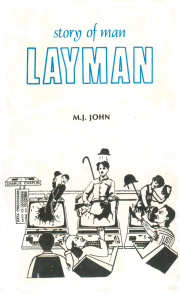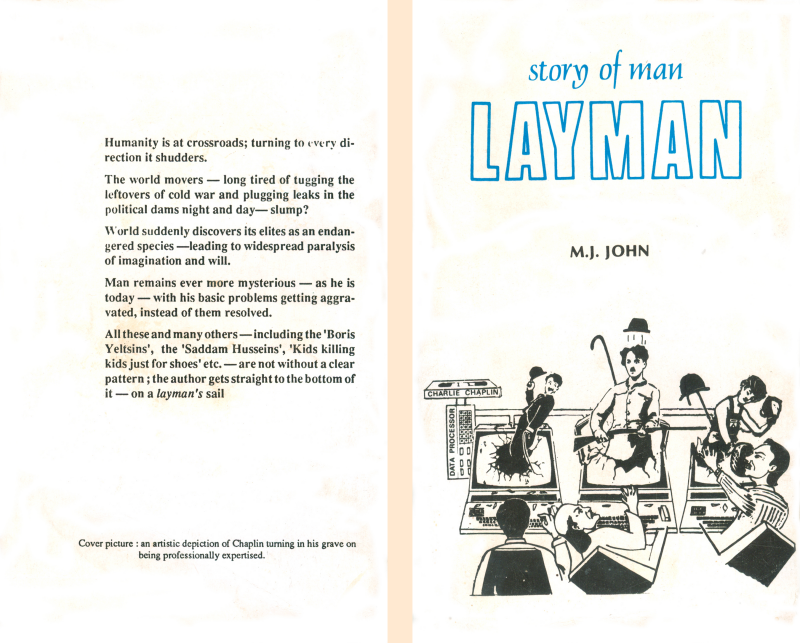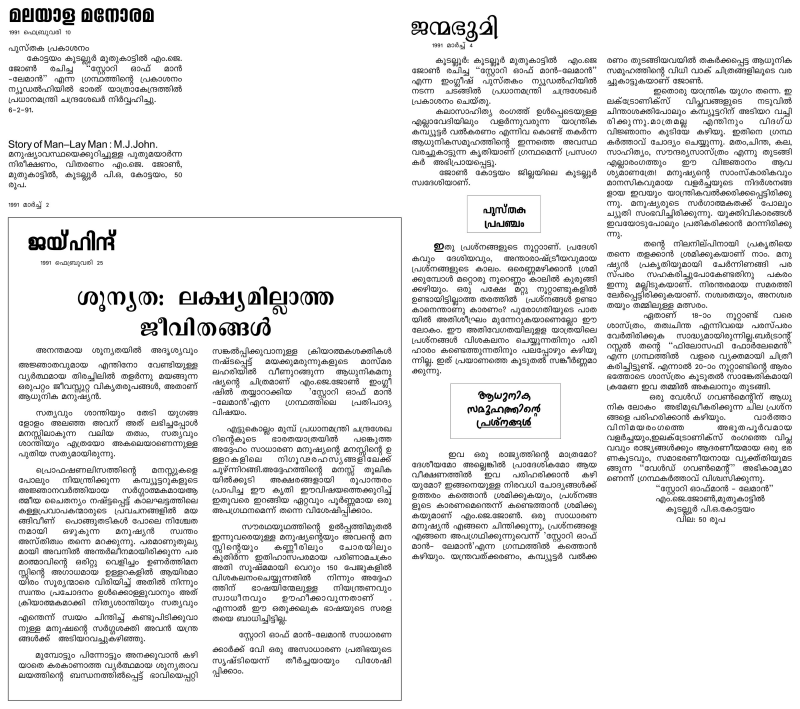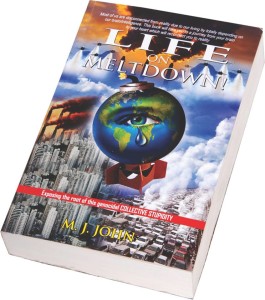 Published in :1990
Published in :1990
Category: Non-Fiction Philosophical – Futurism
The book is a social analysis and a theoretical fight against the professional exploitation of all human creative and intellectual fields.
Story of Man – Layman (1990)
Read Press Report & Reviews Here
Story of Man – Layman (1990)
A Review by Dayanand Edappally
DRILLING INTO THE FUTURE
Story of Man – Layman (1990), the first book by M. J. John, is probably the only book in the world that has foreshadowed almost all global social events that have taken place from 1991 till today. (This book was released by then Indian Prime Minister Chandra Shekhar on 02-02-1991 in Delhi) Starting with the preliminary question of the world’s statuesque, the author provides a threadbare analysis of the turn of events down the centuries. Eventually this study has become warning signal to those at the apex of man-made hierarchies where man is mechanically fitted not on creative impulses but on mechanical inputs leading to the speedy elimination of all natural human instincts.
Today, according to John, the right man is controlled by the wrong system, everywhere. This artificial process has reached such saturation point that a natural counter-revolution is lashing upon man globally that is proving to be suicidal to both man and his systems. Here the author contents that man-–be he the exploiter or the exploited, in the developed West or in underdeveloped rest world-–is today massively swamped by a deep-felt passivity and defensive impulse everywhere, and construes the present lull as the forbearer of an impending storm that is out to lash man which, if not effectively checked, is certain to cost his own existence, as a species.
What once was thought to have been achieved as liberation of strained muscle-power by the Industrial Revolution and, of strained brainpower by subsequent electronic revolution have, alas, come to recoil on man as the virtual freezing of his physical and mental powers due to the long stagnation of long stagnant innate human muscle and mind powers. In the Third World, it resulted in the mechanization and colonization of muscle and mind. Here, John finds the very concept of MODERN SCIENCE, as practiced today, is fundamentally erroneous, and maintains that science is swamped by its own artefacts. Making allusions of its ‘capability’ to shape the collective destiny of mankind, he points out that computer, the latest darling of science, has suddenly sprung up as the new ‘messiah’.
The book, however, is not meant to be a study for prediction. It is a cause book, a theoretical fight against PROFESSIONALISM which the author considers to be the bane of modern civilization, and he proves that this vitiation has led to another affliction of man, namely, the modern science-religion-market nexus. Incidentally the book is the first of its kind in the world that has exposed professionalism as the chief villain of man today.
Here the author’s premise is that in almost every modern event, we can trace a common syndrome, a mechanical sort of knowledge working, as the fundamental behind almost all modern pursuits that he eventually identifies as professionalism. As the ‘mind’ behind every modern ‘success story’, the new idol professionalism today is the much sought-after preoccupation of all modern trends. Every enterprise, be it government or private, multinational or national, runs head over heels in recruiting expert professionals for every top job. Be it in art or politics, fundamental science or applied sciences, philosophy or the theology, professionalism by all means has emerged as the only route to get to the top in an age that is technically managed by folk wisdom–market democracy.
With its increased ramifications of functions in all modern ingenuity, professionalism thus can no longer be gauged and regulated by conventional yardsticks, such as found in dictionaries. In the age of image-race, when every sphere of social man is exposed to the heightened onslaught of universalization through galloping communication revolutions and bold mind-managing ‘adventures’, every attempt to negate the natural, normal or the reality process is accomplished in a seemingly subtle manner, that is, in a sophisticated, abstract or manipulative way. Here, according to the author, professionalism may be defined as the expert interchange of meaning through a ‘positive’ negation of conscience. Plainly, professionalism is the rash exploitation of information, or the expertise that helps man fulfill his lust for artificial perfection, emancipation or what may be called technical success.
The author plunges further to expose all kinds of synthetics or artificial techniques that have already started dictating terms to art, literature, politics, science, economy, tastes, preferences, planning, communication etc. The author goes to the extent of admitting that layman is written with a vengeance, a vengeance against all synthetics in basic, creative fields of human life.
All the “popular modern problems” like terrorism, arms race, nuclear proliferation, growing environmental degradation, suffocating pollution, ozone layer depletion, shrinking ground water and natural energy sources, rising global warning etc. are certain to pale into insignificance once the more lethal and immediate, colossal problems come to the fore. Unless we eliminate the real problems, all our efforts in solving these apparent (popular) problems may end up a futile exercise. By the term “popular modern problems” we mean those problems about which the world today cries wolf day in and day out. Actually today there exist many problems and crises, which are deadlier and more catastrophic than the above popular problems and which have not caught the attention of the present world.
Take, for example, the fast shrinking human wealth (natural wealth) and the fast growing artificial or synthetic wealth. Both these trends are inimical to human existence, let alone to his progress. As the growing of the synthetic wealth is directly proportional to the destruction of the real (natural) wealth the process is proving to be highly suicidal. Money–and today, e-money–goes on cancelling the real wealth at the speed of computer. Then there is the fast shrinking of human health due to widespread degeneration, the shrinking immunity, the decreasing sperm count, the spreading human passivity etc. The growing artificial health care through, for example, genetic engineering and other synthetically propped up formula health care systems are all indeed time-bombs. The professional medical industry wants man always hooked to medicine. It wants man with growing health problems for its continued reaping of ‘success stories’. Then there is the shrinking cognition process and the growing synthetic knowledge process– knowledge replaced as know-how when experts and specialists ‘who know more and more about less and less’ rule the roost until the process reaches the zero level.
Our total dependence on scientific–mechanical–solutions has led us to act-now-or-never situation which, alas, has seriously eroded us of the much needed pause or interval for a second thought. Where are the much needed check and balance with regard to this synthetic methodology called the science-market nexus? Is it because science has emerged as the “undisputed” leader and victor of the game in modern history–the victory in which the victor will never be asked if it ever told the truth?
All these modern developments or modern conveniences (“modern inconveniences” by Mark Twain) propelled and sponsored by the science-market mechanism are all attractive baits which hide the hook of addiction, a la drugs, which man can now neither swallow (for fear of growing pollution and other fatal after-effects) nor eject it. It is like mounting the tiger, from which he can now neither dismount nor can he tame it. This science-market mechanism has become a dangerous liability of man today. The danger ahead is much more lethal than we can foresee, much faster than we can calculate. The problem that we don’t understand this reality is not as serious as the fact that we can do pretty little about it even if we gain a belated understanding.
Suddenly exposed to bear the brunt of pollution from a million sources, and the process going on unabated on a one-up fashion as industrialism and professionalism peaked on every nook and corner of this tiny planet with fast globalizing stimulants like market economy, communism, liberalization and competition, not much time was needed to render the ‘wired globe’ to look organically barren, and man to look naturally passive. As modern science stands mechanically triumphant, nature and man remain completely vanquished.
The world is not allowed to evolve in its natural course. The so-called experts have hampered the world’s progress and brought it under their grip. This too is a sort of revolution, not however accomplished by man, but forced on him, the end result of a long period of non-accomplishment coming to recoil on him. The root cause of this inexcusable inaction is the weakness of will which leads to an over-dependence on experts for everything. They have created the facade of super intelligence and taken control of the lives of men and women. This over-dependence is nothing short of an intellectual suicide. Consequently man’s imagination and creativity have taken a thrashing and collapsed to a paralyzed state.
The author has tried to analyze the world trends of the late 80’s and early 90’s from the point of view of an open-minded layman, unhindered by stock explanations and expert opinions. He is none too happy with the emerging scenario of the third millennium–super-industrial society, electronic dominance, space age technology, global village concept etc. He is apparently worried about the overplay of professionalism with its gobbledygook, clap-traps and machines which tends to replace and ignore man, the crown of all creation. Professionalism has mechanized all thinking, religions, sciences, politics, ethics, aesthetics, arts and crafts, and vitiated the whole social systems. The cults of specialization, forming as solid brain tumors, are fast spreading on the social brain of modern society just as its material version, namely. plastic, forming the physical tumor is engulfing the material world, which, in the process, render modern society sick mentally and physically–apart from polluting the tiny planet beyond repair.
Here the author asks: “How long can we continue sweeping things under the carpet? How long can we bask under illusions and vanity fairs? How long can we depend on virtues made out of necessities? How long can we keep the larger part of the population on “charity”? How long can we turn a Nelson’s eye to the ground realities?
It may be as painful for us to discard long practiced social systems and lifestyles as for the experts, professionals and scientists to discard technical laws and logic, and accept new, natural thinking. Laws, theories and other technical orders are to mechanical systems as water is to fish. But the value of any system can stand no higher than the utility and purpose of its laws, the reversal of which is manifested in the mushrooming of terrorism, crime and, ultimately, the evolution of a fully commercially mechanized social system which has started sending disastrous SOS signals from everywhere.
Let us start thinking of a system or science that man makes as his tool, not a system that makes man as its tool. This system must be a means to understand the natural process and getting closer to our ground realities and purpose of life, not a means or system that leads to the paralyze of the thinking process itself. For, when human chips are down, the mechanical chips, in the hands of middlemen, are certain to acquire value and certain to take over, as is the case today.
To war with the moral system of one’s age may be a terrible thing; to submit to the dictate of illusions, ignorance and helplessness is simply more horrible. In a democratic society, the fate of nations hangs on the moral strength of its people. But when the people themselves are helpless to do anything about it–especially when they are fast elapsing to a state of snobbishness with their morals at the lowest ebb–the whole weight of the sense of fate falls on those who still can afford to think and reason with some clarity and responsibility.
Despite the inflexibility and narrative complexity of the book, which definitely is not for an easy reading, the author has succeeded in unraveling the most crucial of modern myths and the impending dangers to the world order. It is not an armchair academic exercise but words culled from the life of ordinary men. It is a treatise about the doomsday that is ahead and will definitely touch the very senses of modern man and disturb him till he dares find answers and solutions which will be tough but inevitable.
Press Reports And Reviews
“The Prime Minister, Mr Chandra Shekhar, released a book, “Story of Man–Layman”’ by Mr.M.J.John, at a function here on Sunday to mark the eighth anniversary of Bharath Yathra. The book is a social analysis and a theoretical fight against the professional exploitation of all creative and intellectual fields, according to a Bharath Yathra Centere press release”
—THE INDIAN EXPRESS, New Delhi January 9, 1991
“M.J John has, apparently, a very valid and relevant point to make” —C. Radhakrishnan, scientist, writer and novelist, and winner of the National Literary Academy Award, Kerala Academy Award.
“M. J. John has an interesting theory to propound.”—David Davidar, Editor, Penguin Books, India.
“Is science swamped by its own artifacts?’ Is the universe misshapen? Is humanity taking a giant leap–in the wrong, fatal direction? While answering these vital questions on the affirmative, the author makes clear that our over-dependence on experts for everything is nothing short of an intellectual suicide, leading to man’s imagination and creativity taking a thrashing and collapsing to a paralyzed state.” –Janmabhumi Daily, April 21, 1991
“The firsthand, true analysis of the human story ever published.” —Jai Hind (fortnightly)
“I enjoyed reading every bit of it” — Pritish Nandy, Editor, The Illustrated Weekly
“A novel probe into the state of human affairs”– Malayala Manorama Daily
“Reading it, I seem to gain more insight than I had before into the present political scene” — Dr.Hans-Georg-Wlock, Ambassador of Federal Republic of Germany to India.
“A fascinating book” — Walter K .Andersen, First Secretary, American Embassy New Delhi, December 19, 1990.
“The book is a sharp, critical pointer to the present state of mankind”—Mangalam Daily.





